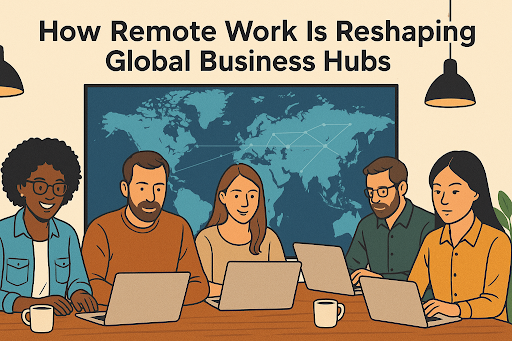It used to be simple. If you wanted to make it in finance, you packed your bags for London or New York. Tech dreamers? Silicon Valley or bust. Creative types? Berlin, Paris, maybe a co-working space in Amsterdam with too much exposed brick.
But then came remote work, barging into the global office like a colleague who forgot deodorant. Suddenly, geography wasn’t destiny anymore. Laptops became passports, Wi-Fi the new visa. And just like that, the idea of a “global business hub” started looking as outdated as fax machines.
From Skyscrapers to Slack Channels
Once upon a time, corporations built monuments to ambition: glass towers, marble lobbies, espresso bars staffed by people who judged you for ordering decaf. Cities thrived on it. Workers followed jobs; jobs clustered where capital and infrastructure lived.
Now? The hub is virtual. Slack channels replace watercoolers, and Zoom meetings stand in for conference rooms with bad air conditioning. Sure, people still commute—just from the bedroom to the kitchen table, tripping over Legos along the way.
The shift isn’t just cultural. It’s economic. Cities that once relied on armies of office workers are facing identity crises. Ask New York’s midtown landlords or San Francisco’s café owners who miss the steady drip of double lattes from stressed developers.
New Maps of Power
What’s happening is a kind of digital gentrification. Smaller cities, once dismissed as “secondary markets,” now wear the crown. Lisbon is wooing tech workers with sunny coworking spaces and affordable rents (for now). Mexico City cafés are buzzing with laptops in every corner. Tallinn, Estonia, is practically handing out e-residency cards like candy at Halloween.
These shifts create new winners and losers. Some global hubs double down, reinventing themselves as playgrounds for hybrid workers. Others see their relevance evaporate like spilled cold brew on a MacBook.
The Global Shuffle
Remote work has untangled the knot between where talent lives and where companies operate. A software engineer in Lagos can now contribute to a San Francisco startup without leaving her neighborhood. A designer in Kraków can land clients in Dubai.
It’s a decentralization of opportunity, a bit like scattering poker chips across the table instead of stacking them in one neat pile. And speaking of poker chips—have you noticed how even betting platforms have followed suit? Remote work didn’t just transform offices; it reshaped how we play. On 22Bet, for example, players from different time zones log in, place bets, and share the same digital table, no matter if they’re in Nairobi or Naples. It’s globalization without the jet lag.
That accessibility has blurred the borders of business and leisure. You can finish a Zoom call, spin a roulette wheel on your phone, and still have time to water your plants—all before lunch.
Why Companies Love It (and Fear It)
For businesses, the appeal is obvious. Remote work trims real estate costs and expands the talent pool. Why pay Silicon Valley salaries when you can hire equally brilliant people in Sofia or Buenos Aires? Why rent 20 floors of an office tower when 80% of your team is happier working in pajamas?
But there’s a flip side. Culture doesn’t translate easily over Wi-Fi. Building loyalty through emoji reactions is… let’s say challenging. Remote work also forces companies to rethink management. Micromanagers, once kings of the swivel chair patrol, are now powerless. Workers measure success by results, not hours logged under fluorescent lights.
The Human Side
Of course, it’s not all sunshine and Slack notifications. Remote work has created new kinds of loneliness. The camaraderie of Friday drinks, the unspoken bond of eye-rolling at a boss’s bad joke—those rituals are harder to replicate online.
And let’s not forget the time-zone gymnastics. If you’ve ever taken a call at 2 a.m. because your teammates live 10 time zones away, you know remote work isn’t always glamorous. Your cat doesn’t respect “mute” buttons, and your neighbor’s drill feels louder than any subway ever did.
What’s Next for Global Hubs?
So, are we watching the death of global business hubs? Not exactly. Cities are stubborn things. New York won’t stop being New York, and London isn’t about to shut down the Tube. But their roles are shifting. Instead of being the only places to “make it,” they’ll compete with dozens of emerging hubs, each with their own flavor.
Think of it as a playlist. Once, we all listened to the same few songs on repeat. Now, the world’s talent and companies are shuffling between genres, mixing and matching. Some days it’s a Tokyo beat, other days a Lagos rhythm.
The Office is Everywhere
Remote work hasn’t destroyed the idea of a hub. It’s multiplied it. The office is no longer a building—it’s a network of humans tethered by Wi-Fi, productivity apps, and the occasional power outage.
The next big innovation in global business might not be a new skyscraper in Dubai or a mega campus in California. It might be a living room in Yerevan, a beachside apartment in Bali, or a quiet flat in Warsaw.
The global economy has learned something powerful: hubs aren’t about where you go. They’re about who you connect with. And as long as the Wi-Fi holds, the possibilities are endless.
Keep an eye for more latest news & updates on Discover Tribune!



